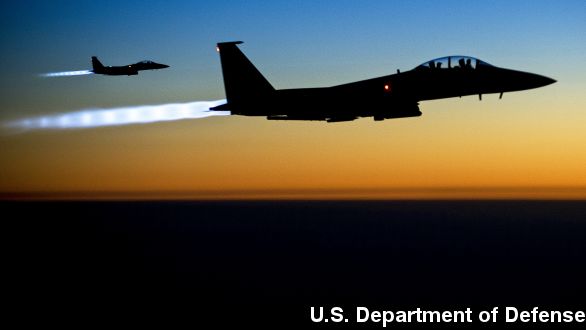The U.S.-led coalition against ISIS got even bigger Friday with the addition Denmark, Belgium and the United Kingdom. But at over 60 nations, does a bigger coalition make the fight against ISIS that much more effective?
The three European countries have pledged air support, but not a single country so far has pledged any ground support for Iraq’s military, which has suffered numerous setbacks. (Video via PressTV)
The most recent of which came Sunday with the loss of a military base in Iraq’s western Anbar province. According to The Long War Journal, hundreds of soldiers are dead or missing after 200 were forced to flee an ISIS attack.
Losses like that have some analysts believing ISIS can't be crushed without the presence of more Western troops on the ground.
PETER MANSOOR VIA CNN: “But because we don’t have American forces on the ground, no boots on the ground according to the president, then this sort of thing happens and it will continue to happen"
That’s not to say the U.S. hasn’t sent troops to Iraq. It has. President Obama has deployed more than 1,000 military personnel — mostly advisors — to the Middle Eastern country since June. (Video via The White House)
And Canada announced it was sending at least 70 non-combat personnel in early September, with it considering sending more at the U.S.’s request.
But then there’s Syria. No other coalition members aside from the U.S. and its Arab allies have committed to striking ISIS in Iraq’s neighbor where the group is perceived to be strongest. That’s something a correspondent for Al Jazeera says makes some Baghdad officials worried. (Video via U.S. Central Command)
IMRAN KHAN VIA AL JAZEERA: “They’re worried, a lot of countries are coming on board just to attack Iraq. … They’re wondering why that is, why aren’t the international coalition more unified when attacking Syria and Iraq.”
That may not be the case for too long though. While the U.K. opted not to vote on bombing Syria, the BBC reports it’s not out of the question for Prime Minister David Cameron.
DAVID CAMERON VIA BBC: "Left unchecked, we will face a terrorist caliphate on the shores of the Mediterranean and bordering a NATO member, with a declared and proven determination to attack our country and our people.”
And as CNN points out, even with the limitations of the coalition so far, it has still been effective. One military analyst told the network the airstrikes have helped “blunt the momentum of ISIS in Iraq.”
The latest coalition strikes came Saturday, helping Kurdish forces defend the embattled city of Kobanê on the border of Turkey and Syria.


